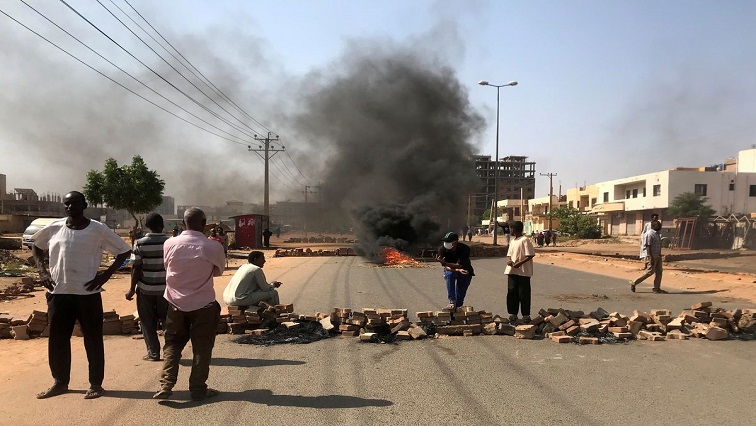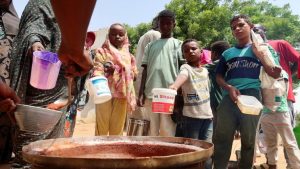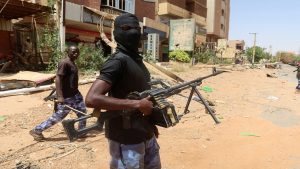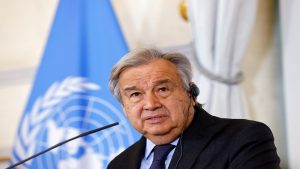United Nations Secretary-General, Antonio Guterres, has condemned the ongoing military coup in Sudan and called for the immediate release of political detainees, including Prime Minister Abdalla Hamdok.
An earlier tweet from Guterres condemned the military’s illegal power grab and called for the full respect of the country’s constitutional charter in order to protect the hard-won political transition in the country.
I condemn the ongoing military coup in Sudan. Prime Minister Hamdok & all other officials must be released immediately. There must be full respect for the constitutional charter to protect the hard-won political transition. The UN will continue to stand with the people of Sudan.
— António Guterres (@antonioguterres) October 25, 2021
His views were echoed by the United States that expressed its deep alarm, warning that a military takeover would put at risk Washington’s assistance to the country.
International condemnation came thick and fast as the military dissolved the transitional government that has sought to steer the country after the ouster of longtime former leader Omar al Bashir.
UN Secretary-General Spokesperson Stephane Dujarric says: “The Secretary-General strongly condemns the ongoing military coup d’état in Khartoum and all actions that could jeopardise Sudan’s political transition and stability. He calls for the immediate reconstitution of the governing arrangements provided for under the Constitutional Document. The unlawful detention of the Prime Minister, government officials and politicians is unacceptable and contravenes the Constitutional Document and the partnership critical for the success of Sudan’s transition. The Secretary-General calls for the immediate release of the Prime Minister and all others who have been detained arbitrarily.”
Calls for dialogue
Guterres also called on Sudanese stakeholders to immediately return to dialogue and engage in good faith to restore the constitutional order and Sudan’s transitional process.
But the country’s most senior military leader General Abdel Fattah al-Burhan earlier declared a state of emergency while announcing that a caretaker government would shortly be appointed to lead the country to elections in July 2023.
And despite a strong military presence, protestors took to the streets on Khartoum to reject the military’s intervention, while the whereabouts of ousted government leaders remained a mystery.
Secretary General Special Representative to Sudan, Volker Perthes, says: “The situation is still fluid and we are not able to ascertain all of the reports which we are getting. But what do we know is that the army this morning has detained or put under house arrest Prime Minister Hamdok and then reportedly brought him and his wife to an unknown destination or unknown location after he reportedly refused to dissolve the government that had been a demand from the military for a couple of days. Also, other government officials, including the Minister of Cabinet Affairs, the Minister of Information, the Minister of Industry and a couple of others have been arrested and we don’t know where they are. The same applies to some members from the sovereign council as well as some journalists.”
Economic ramifications
With reports that consumer inflation had reached close to 400% this year, concerns that the economic situation that contributed to former President Bashir’s fall had not been adequately addressed.
This includes shortages of goods like fuel, wheat and even medicine.
Former Joint AU-UN Envoy to Sudan Ambassador Kingsley Mamabolo says: “The intention of the coalition was good, and obviously this was going to be a coalition that is in transition, which is going to be preparing the country for elections for a new constitution, but also begin to do something about the economy, the situation that you just described now. Remember that this situation was the downfall of Bashir and despite the fact that you had this political coalition and so on, it didn’t mean the problems went away. It meant the economic problems that were there were still there, and the country was still going to suffer so the same problems that beset the Bashir regime, the new coalition partners were faced with those same kinds of problems. And to the extent that they are not able to resolve those problems, to the extent that the international community is not intervening enough to assist in that economic process of revival, the extent to which they would also be in danger of falling.”
The U.N. Security Council is expected to convene Tuesday to discuss developments in Sudan.
Video | SABC News UN Correspondent Sehrwin Bryce-Peace explains the UN’s stance on the situation in Sudan:






